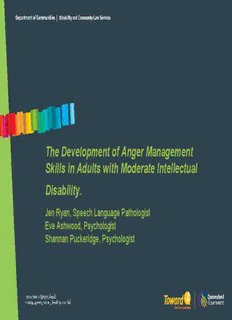
The development of anger management skills in adults with PDF
Preview The development of anger management skills in adults with
The Development of Anger Management Skills in Adults with Moderate Intellectual Disability. Jen Ryan, Speech Language Pathologist Eve Ashwood, Psychologist Shannan Puckeridge, Psychologist Overview • Background to Anger Management • The “How Anger Works and Keeping Cool” Programme • Results of three groups • Future directions What is Anger? • Anger is an emotional state influenced by physiological and cognitive factors. • The emotion of anger is usually a response to a specific trigger which is mediated by the person’s beliefs and expectations about the situation. • Novaco (1975) views anger as an emotion with three components; physiological, behavioural and cognitive. – These are addressed in therapy by using relaxation, behavioural coping skills and cognitive restructuring. • Anger management programs in which participants are taught techniques for coping with anger-provoking situations are effective and useful in decreasing the expression of anger by clients with intellectual disability. Anger in Intellectual Disability • There is preliminary evidence that people with disability present with higher rates of anger control problems compared to people without disabilities (Hagiliassis, et al., 2005; Rose & Gerson, 2009; Smith, Branford, Collacott, Cooper, & McGrother, 1996) • People with intellectual disability often have unmet physical and interpersonal needs. These life experiences can lead to personal distress, manifested as anger. • Anger expressed as aggression can result in obvious negative outcomes for the individual with a disability including; – Restricted opportunities – Limited access to the community – Limited accommodation placements – Lack of available carers – Impaired family and social relationships – Poor physical and emotional well-being Target Group • Individuals with – Intellectual disability. – High Support Needs. – Aged 18-65 years of age • The person may also have challenging behaviour. The “How Anger Works and Keeping Cool” Programme • 8 week programme • 2 hour sessions • Provided with handouts, worksheets, carer information sheets and homework tasks. • Pre-group and post-group interviews and assessments. Interviews & Assessments • Knowledge Questionnaire – Developed for the programme to ascertain current understanding of physiological, cognitive and behavioural components of anger for each participant. – A similar questionnaire was administered to the participant’s carer or family. – Example Questions: • What do you do when you get angry? • If you had to rate your anger out of 5 (1 being that it is not bad at all and 5 being that it is really bad) what would it be? • How much does the Anger worry you? (1 being that it is doesn’t worry you at all and 5 being that it is really worries you) what would it be? • Draw (or write) on the body what happens to you when you get angry Interviews & Assessments • The Aggression Questionnaire – Developed by Buss and Perry (1992) – 29 statements where people are asked to indicate how uncharacteristic or characteristic each statement is, using a five-point scale. – Normative sample was 1,253 individuals without intellectual disability. – Scale adapted for participants, enabling more concrete representation of the abstract concept. Session One – Introduction to the Programme • Understanding the difference between anger and aggression (i.e., emotion of anger vs. physicality of aggression). • Begin developing group trust and safety amongst members • Establishing group rules, goals and commitment to change
Description: